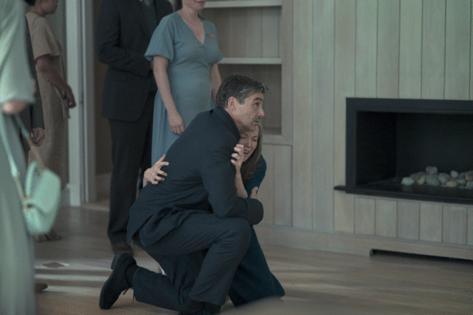Movie review: 'Anniversary' a character study of creeping fascism
Published in Entertainment News
Polish director Jan Komasa might be best known in the United States for his 2019 Oscar-nominated film, “Corpus Christi,” but his biggest box office success was in Poland, for his 2014 film “Warsaw 44,” about the Warsaw Uprising, the bloody effort by the Polish resistance to expel the occupying German army from Warsaw toward the end of World War II.
Komasa knows authoritarianism, in its most flagrant, brutal forms, but his new film “Anniversary” imagines a scenario in which fascism doesn’t stomp in jackbooted, but creeps, pretty and ladylike, on kitten-heeled feet. It’s a thought experiment more than anything else, from a story by Komasa and Lori Rosene-Gambino, who wrote the screenplay.
“Anniversary” maps five years in the life — and obliteration — of an American family, a microcosm of a larger rapid political evolution that turns suburban utopia dystopian with a speed that could make your head spin.
Meet the Taylors: we’ll get to know them across reunions and celebrations starting with an anniversary party for Ellen (Diane Lane) and Paul (Kyle Chandler). She’s a professor at Georgetown, a public intellectual caught up in the university culture wars debate, he’s a chef, and they have four children upon whom they dote: Cynthia (Zoey Deutch), an environmental lawyer, Anna (Madeleine Brewer), a provocative comedian, high school science nerd Birdie (Mckenna Grace), and brother Josh (Dylan O’Brien), a nebbishy, struggling writer. The camera knits them all together in long shots, swirling around their idyllic backyard.
Josh has brought home a new girlfriend, Liz (Phoebe Dynevor), who is carefully coiffed and poised; immaculately presented and mannered, though her perfection gives his sisters pause. After the introductions, she and Ellen have a quiet, awkward moment together. As one of Ellen’s former students, Liz wrote a thesis that scandalized the professor, which Ellen describes to her husband as having “radical anti-Democratic sentiments,” advocating for a single party system. The title? “The Change.”
While Liz says she “came here with the best of intentions,” and claims she and Josh were introduced by their shared agent, Ellen is suspicious, and rightly so. The enigmatic Liz is mild-mannered and quiet, but her ideas are anything but. As she hugs Ellen, she whispers, “I used to be afraid of you but I don’t think I am anymore.” That is never more clear when she sends Ellen a copy of her newly published book, “The Change,” dedicated to “the haters, the doubters, and the academic stranglers.”
Two years later, the Change is officially afoot. Liz is as celebrity, now working with a mysterious organization called the Cumberland Company. She and Josh are married, pregnant with twins, and he’s achieved a conservative glow-up. New flags are popping up in the Taylor’s well-heeled neighborhood, and things are shifting in ways that make Ellen uncomfortable, enraged even. But in the spirit of politeness and family unity, she acquiesces to Paul’s desire for a nice family Thanksgiving, despite their political differences.
Therein lies what might be “Anniversary’s" biggest warning: don’t let the fox into the henhouse, even if it seems rude not to. Ellen maintains an appropriately wary distance and skepticism of Liz, but Paul’s fatal flaw is his assumption of good faith. He hasn’t even read “The Change,” because frankly, he doesn’t want to know. But as Liz attaches herself to Josh like a parasite, perhaps in an attempt to enact revenge on her former professor, so too do the other Taylor children topple, as the nation changes under their feet.
Some might find “Anniversary” too vague about what, precisely, is Liz’s political stance that makes her so powerful, and so repugnant to Ellen? She has advocated for a “single party system” branded under the guise of “solidarity,” but the result is an autocratic surveillance state that suppresses free speech, upheld by a violent paramilitary police force. The film never gets into the specifics, perhaps because the only ideology of fascism is the concentration of power. “Anniversary” suggests the rhetoric doesn’t matter when we can turn on each other so easily, humanity and freedom crushed under such a state.
It is fascinating that recent cultural output that attempts to grapple with contemporary sociopolitical issues often feminizes the threat: take the #MeToo cancel culture fable “Tár,” or this year’s academia scandal film “After the Hunt.” “Anniversary” situates a nonthreatening woman as the vessel for such evil, even as Liz’s male host, Josh, starts to embody the most extreme outcomes of what she has set in motion.
“Anniversary” is a deeply nihilistic film that can’t be described as a cautionary tale — that horse has left the barn. Rather, it’s a hypothetical question as character study, an examination of how this happens, and an assertion that a system like this shows no mercy, not even to its most loyal subjects, despite what we want to believe.
———
'ANNIVERSARY'
3 stars (out of 4)
MPA rating: R (for language throughout, some violent content, drug use and sexual references)
Running time: 1:51
How to watch: Now in theaters
———
©2025 Tribune Content Agency, LLC
















Comments